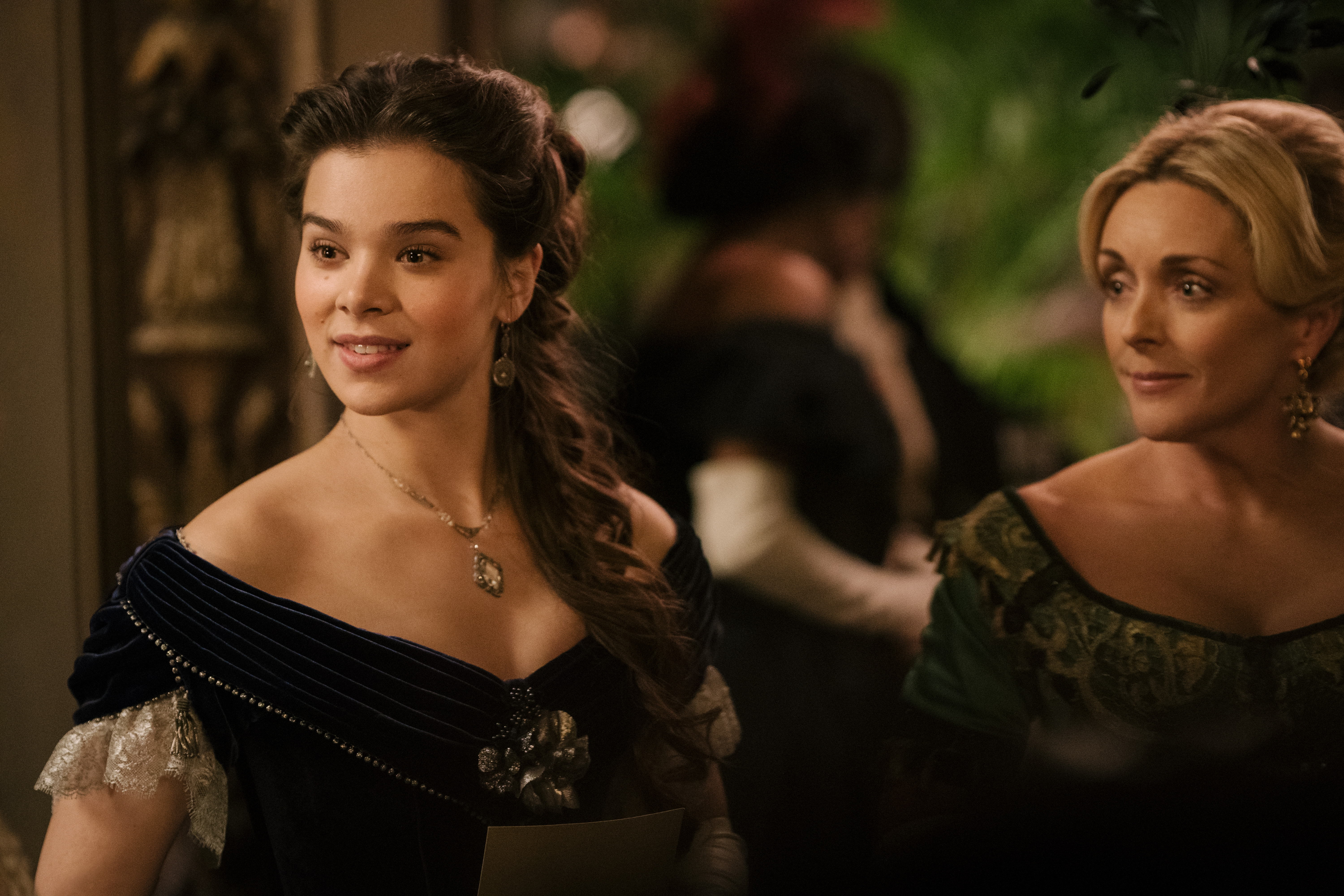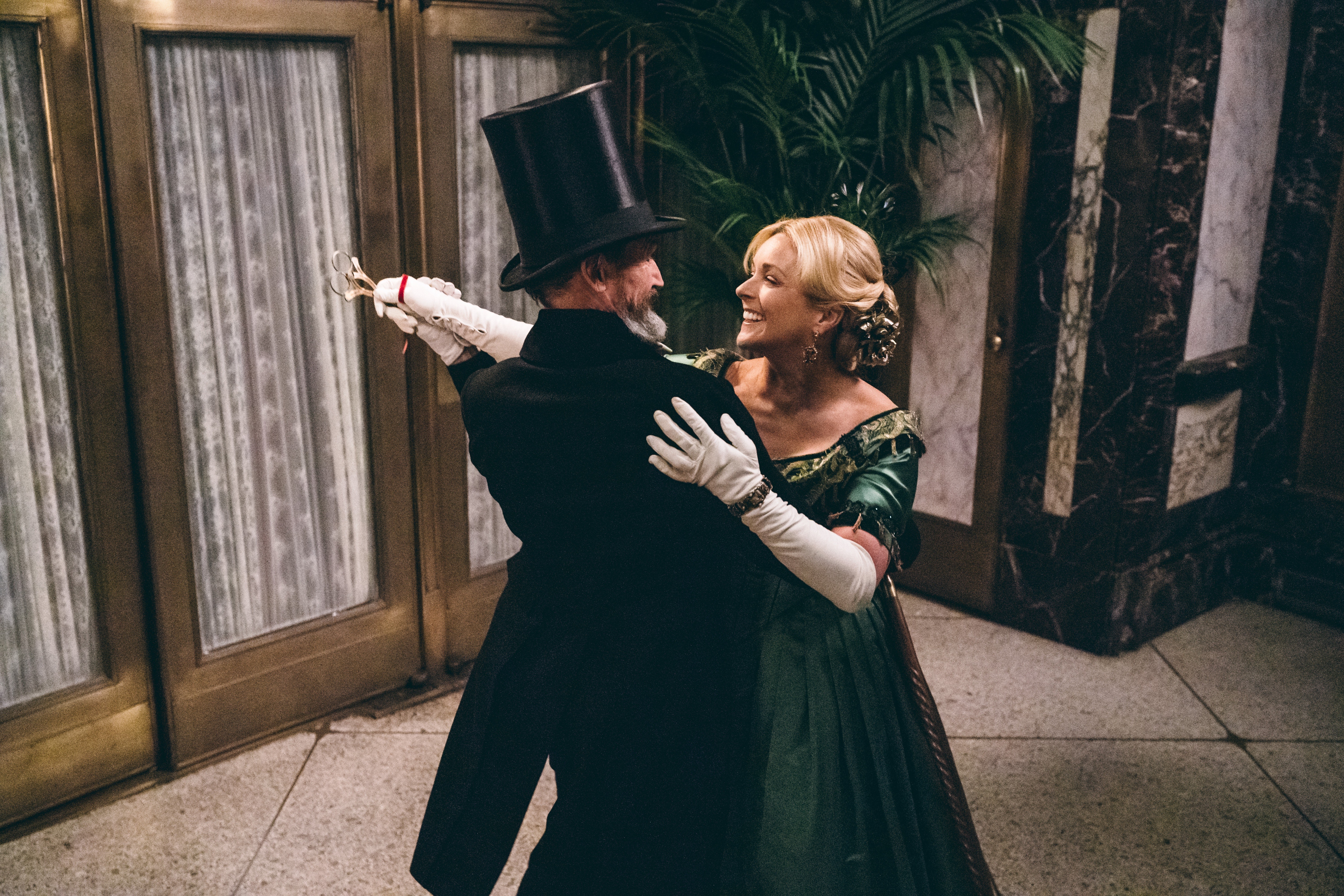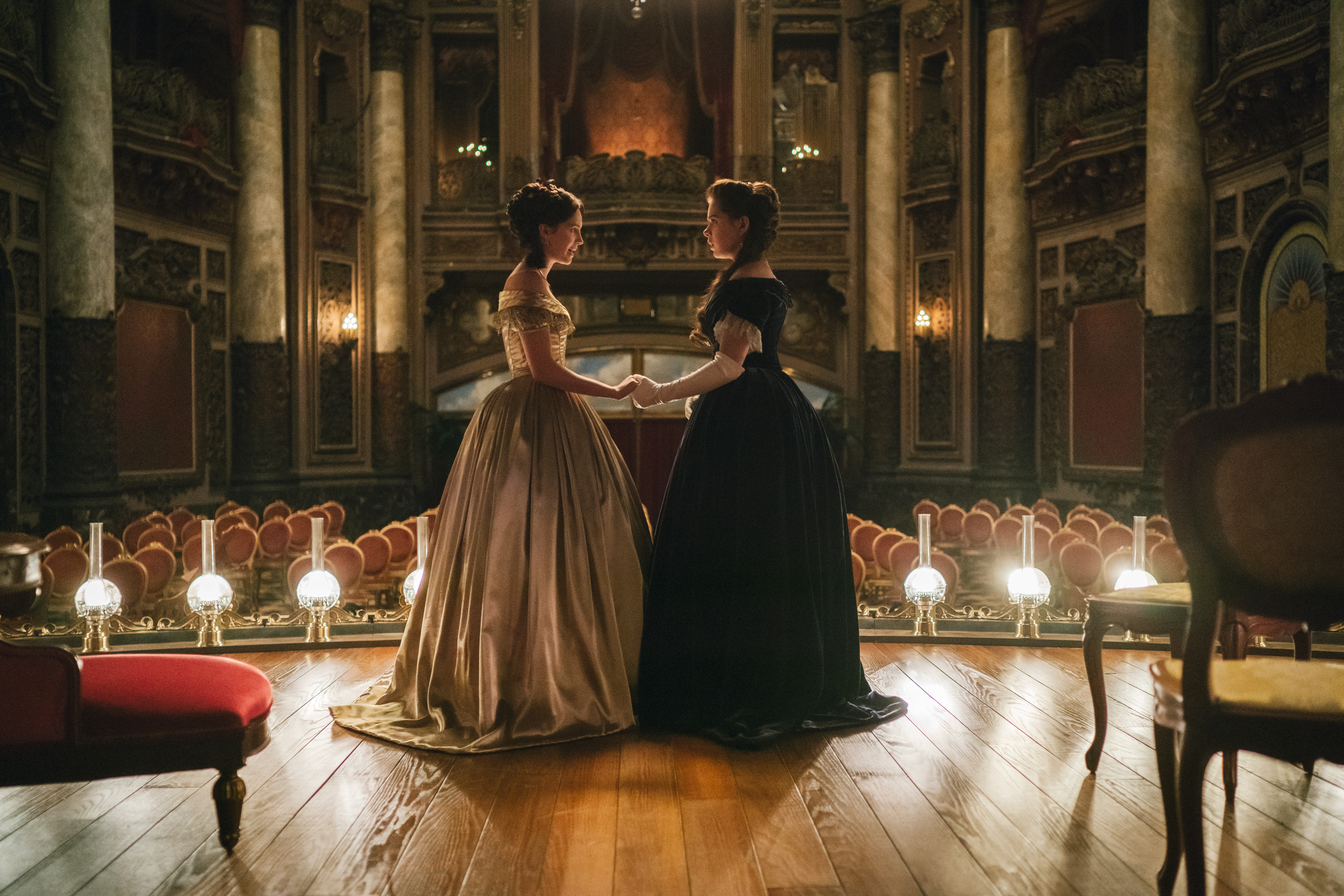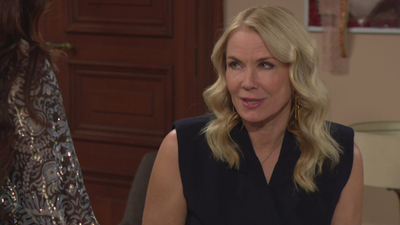What to Watch Verdict
Set within the stunning new opera house, this dramatic backdrop elevates the already dizzying mood in an excellent episode that leaves it all on the stage.
Pros
- +
🌸The chemistry between Hailee Steinfeld and Ella Hunt is intoxicating.
- +
🌸Emily Dickinson's poem in song form is stunning.
- +
🌸The stunning opera house backdrop.
- +
🌸The dizzying blurred line between reality and fantasy.
- +
🌸The back row Dickinson family lighthearted relief.
Cons
- -
🌸Despite being told otherwise it is impossible to trust Samuel Bowles.
This post contains spoilers for Dickinson.
Read our last review here.
The peril of fame and celebrity is an underlying theme in the second season of Dickinson that has seen Emily (Hailee Steinfeld) debate with ghostly figures, legendary landscape architects, her editor and, ultimately, herself about the steps she wants to take. Now a beloved opera singer has joined the chorus of people who have an opinion about what it means to step into the light. In the first episode of this season, Sue (Ella Hunt) told Emily she could no longer be an audience of one because the way Emily’s poems made her feel was too overwhelming. Our relationship with art (and the artist) is deeply personal and to be moved by someone’s words can crack open your heart and soul in unexpected ways. Adelaide May’s (Kelli Barrett) performance of La Traviata has a profound impact on Emily, and after using Samuel’s (Finn Jones) backstage pass she tells the singer “You changed my life tonight.” Is it Adelaide, Sue, or another reason that has led to this revelation?
Adelaide is jaded about this profound impact — she’s heard these hyperbolic statements in countless fan interactions — and before Emily has laid down this missive Adelaide has already remarked “I felt nothing” about this so-called life-affirming performance. Rather than fleeing from the cynical star, Emily presses on and remarks that her voice will haunt her forever. To this, Adelaide starts to dissect the meaning of the word “forever” in art, noting things go in and out of fashion and that everyone will eventually be forgotten. This debate about longevity is particularly pointed, knowing as we do, where Emily Dickinson stands in the pantheon of great writers and her singular style that still holds so much power.

Unlike other famous historical figures who have appeared on Dickinson, there is no iconic American opera star called Adelaide May. Rather, this interpretation appears to be based on Dickinson’s meeting with global opera sensation Jenny Lind in 1851 during the sold-out US tour. in a letter to her brother, Emily remarks on Lind’s incredible stage presence, “How we all loved Jenny Lind, but not accustomed oft to her manner of singing did'nt [sic] fancy that so well as we did her.” Weaving the fantastical with historical accuracy, Alena Smith’s exploration of Emily Dickinson can be difficult to categorize — much like the poet — and the anachronistic music and dialogue might suggest to some viewers that this is simply a playful portrayal. But it goes much deeper and the focus on fame in Season 2 digs into Emily’s complex relationship with this notion. Furthermore, this juxtaposition between the frivolous and serious endeavors encapsulates how contemporary audiences (and critics) interact with art.
There is a moment early in the episode when Lavinia (Anna Baryshnikov) waxes lyrical about opera — in true Lavinia style, she has done all her research. And her description could be doubling as a missive about Dickinson the show:
“You know, people’s reaction to opera the first time they see it is very dramatic. They either love it or they hate it. If they love it, they will always love it. If they don’t, they may learn to appreciate it, but it will never become part of their soul.”
There has been critical acclaim for the Apple TV+ series (including a Peabody Award) but there is also a proclivity of treating this series as something that lacks depth because Billie Eilish appears on the soundtrack or modern slang is uttered. Rather than dishonoring Emily Dickinson the poet, it is grappling with issues that plagued female writers in the mid-1850s as they do now. It is fascinating watching the way Smith’s script manages to weave critical theory and romance in “Split the lark.”

Dickinson's strength is in the way it blends anti-historical elements with a deep understanding of its subject and how this period fits in with contemporary themes. This episode blurs the line between fantasy and reality in several scenes including Emily’s conversation with Adelaide. During the performance, Emily’s intense reaction occurs after she sees Sue on stage singing the poem that Sam rejected (without reading). “Split the lark” has previously been set to a musical arrangement and when Sue sings Emily’s words it is clear why. This complicated relationship is the beating heart of the series and this haunting rendition by Hunt hammers this home. Despite their close living proximity, there have only been brief (and intense) moments between this pair all season. However, between this performance and the imagined conversation in the final scene, it is an incredibly satisfying episode for this complex relationship.
Laying the groundwork for this smooth transition between the two actresses are familiar visuals. Adelaide’s gold performance gown wears similar to Sue’s season premiere stunner and Austin (Adrian Blake Enscoe) points out that the scene on stage looks like one of her parties. Both scenes with Sue as Adelaide are dizzying, which highlights the potency (and chemistry) of this pairing. Watching from the wings is Sam Bowles and this love triangle of sorts takes a turn for the complicated when Sam reveals how inappropriate Emily’s letter was. Sue watches their conversation through her opera glasses and she is more occupied by this drama than what is occurring on stage. The editor rejects Emily’s latest poem and blames her for why his wife didn’t accompany him to this event. He claims he is faithful, but it is hard to trust the charming editor. Yes, I might be falling for the unsubstantiated rumors, nevertheless, there something off about how Austin responded when Sam joins the happy Dickinson clan.

Austin continues to exhibit signs of being untethered that see him wistfully talking about his youthful days of folly after he has run into an old college friend. He talks about organizing a reunion and rather than accompany his wife back to the hotel he makes a rather pointed remark about not caring who she goes home with. It is a cruel dismissal and one that suggests something else is bothering him beyond their usual disagreements. Furthermore, Austin is brought to tears by the opera and this character evolution from last season’s happy-go-lucky figure is incredibly effective.
Meanwhile, the Dickinson family members who languish in the back row of the orchestra provide some light-hearted relief. Lavinia’s enthusiasm is not shared by fiancé Ship (Pico Alexander) who is more interested in some back row action of another kind. This is one occasion where the youngest Dickinson does not want to embark on a sexual adventure as she is ecstatic about what she is witnessing on stage. Despite Mrs. Dickinson’s (Jane Krakowski) exuberant entrance, she regrets not wearing her cape — pointedly noting that Sue wore hers — before realizing she would rather be at a Vaudeville show. Unlike the other romantic pairings, she is on the same page as Edward (Toby Huss) and the recent conflict in their marriage has been resolved. Sneaking out before it has finished they celebrate being free from their boredom with a celebratory dance, which is delightful.
In the final scene, Emily is also triumphant and she looks every inch the star in a deep blue velvet gown. Set within the stunning new opera house, this dramatic backdrop elevates the already dizzying mood in an excellent episode that leaves it all on the stage.
Emma Fraser spends most of her time writing about TV, fashion, and costume design; Dana Scully is the reason she loves a pantsuit. Words can also be found at Vulture, Elle, Primetimer, Collider, Little White Lies, Observer, and Girls on Tops. Emma has a Master’s in Film and Television, started a (defunct) blog that mainly focused on Mad Men in 2010, and has been getting paid to write about TV since 2015. It goes back way further as she got her big start making observations in her diary about My So-Called Life’s Angela Chase (and her style) at 14.












